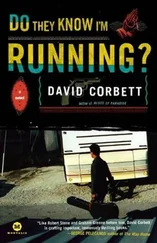“This must be where the iconoclasts dock,” Abatangelo offered. A stenciled sign nailed to a fence post read, WELCOME TO THE IRISH PENNANT- THOSE FOUND IN SKIFFS NEAR THE DOCKS AT NIGHT ARE LIKELY TO BE FOUND IN THEM COME MORNING.
Garbage seethed out of brimming Dumpsters. A dog wearing a bandana collar barked from a paintless foredeck as the car eased past, joined by other dogs as yet unseen. A toddler in knee-soiled pajamas, holding a metal cup, stared, reaching behind one-handed to scratch. An inverted kayak rested on sawhorses amid a clutter of paint cans and tangled sail; two shirtless longhairs were stripping the hull with putty knives, sharing a bottle of peach schnapps as they worked. One of them spat into his paint shavings as the car went by.
When the marina lane came back around, a long brick wall standing chest-high ran parallel to the gravel for a hundred yards or more. Only the water stood opposite. A lone oak tree rose from the grass to the west. Abatangelo told Waxman to pull to the side.
“You can walk?” Waxman queried, turning back to Frank.
Frank didn’t respond. He was staring out at the low wall which bore two fresh scrawlings in white paint.
The Son of Man is following out His appointed course.
Woe to that man by whom He is betrayed.
– Luke 22:22
Bring your pants
If you wanna dance.
– Felix the Cat
Waxman followed Frank’s glance, adjusted his glasses, and read along. With forced humor, he quipped, “Proof at last. The Devil does quote scripture. And pop culture.”
“It wasn’t here before,” Frank said. He scoured the distance in every direction, the marina, the waving tall grass, the gravel road arcing back toward the refinery.
Abatangelo said, “Looks like your friends intend to proceed.”
“That’s not all they intend,” Frank answered, flinching as he read the white words over and over. Woe to the betrayer.
“Let’s leave,” Frank said. “Please.”
“Not yet,” Abatangelo told him. “I want a closer look.”
He gripped Frank’s sleeve and pulled him across the seat. Frank stepped out of the car, looking everywhere at once. Sniffing the air, he labored across the weed-choked gravel, Waxman doting alongside.
“Show me what you were talking about.” Abatangelo said.
Frank swallowed, scanning again the various distances. No idling cars. No waiting men. He flexed his hands, wiped them on his sleeves, then pointed. “One group lines up along the wall,” he said, “the other along the water. The drivers trade places, simple and quick. Headlights signal when things are okay. That’s that.” He looked at Abatangelo, who was frowning. “I’m not making this up.”
“I didn’t say you were.” Abatangelo checked the roads in and out, mentally trying to gauge the time it would take to arrive and leave. “Not yet, anyway.”
He stared out at the dull water, the abandoned derricks in the distance, the refinery behind. Winter twilight mottled the sky, a low red sun descending into scattered clouds.
He tried to picture what would happen. It would take a matter of seconds for Shel to be passed from one set of cars to the other. No one would dally. They loathed each other too much for that. He checked back toward the marina, the nearest boat rested 150 yards away at least. He could set up a tripod in the water, shield himself with the hull in the darkness, use the infrared with a telephoto. But the resolution would be poor, he wouldn’t get faces.
He moved closer to the wall, pulling Frank along by the sleeve. A dirt mound abutted the bricks on the leeward side, leaving a trench that a smaller man might fit into, and yet it seemed too obvious. He looked beyond the wall then, across the mound, and spotted an incinerator shelter further into the grass, thirty yards back from the gravel road. The fact he hadn’t seen it at first encouraged him.
“Wax,” he said over his shoulder, “keep Frank company here.”
Waxman sidled forward to Frank’s side as Abatangelo jumped the wall. The ground was marshy underfoot. Mice fled through the tall grass, retreating from each step. The shelter was a cinder-block windbreak, three-sided, waist-high. A wire incinerator black from old fires stood amid a debris of charred paper, blackened soup cans, moldy singed cardboard. Abatangelo kicked the larger cinders into the grass. The interior walls wore a film of soot. Abatangelo crouched down and decided that, kneeling, he could hide here.
He looked back across the mound to a tall hurricane fence, the road back toward the highway in the distance. He could use the refinery lights for bearings, park beyond the railway tracks. It was a plan. He could hide here till the vans arrived, then move up crouching through the grass, burrow down against the wall. It was the least chancy option he had.
He wiped the soot from his hands onto his trousers, sidled back toward the wall and eased back down onto the gravel. If these people were who Frank claimed they were, they’d be here, no matter how rough it promised to be. They wouldn’t miss it. He glanced over his shoulder one last time, studying the long low wall, craning to see the incinerator and feeling vaguely good about it now.
As the three of them moved back toward the car, the marina dogs resumed barking. Faces peered out from the boats. It occurred to Abatangelo that, from this distance, there was no telling if Felix Randall wasn’t one of them. Felix, or one of his men. The two longhairs stripping the kayak had the right testy swagger, he supposed. It seemed wise not to raise this prospect with Frank. He didn’t want him bolting. Once they were in the car again, though, he made sure to keep an eye trained out the back, to see if anyone followed. He wasn’t sure whether he felt relieved or not when no one did.
Once they were safely around the turn, heading back out toward the highway, he asked Frank, “Why would anybody agree to come out here? It’s perfect for a trap.”
Frank sat hunched over, rocking to warm himself, arms tucked close to his body and hands buried inside his shirt. “Don’t ask me,” he said. “Ask the guys who wrote those little slogans on the wall.” He looked up, his face drawn and pinched about the mouth. “They’ll be here. They’ll all be here.”
Abatangelo nodded. It wasn’t an answer. “I hope so,” he said, letting it go. He studied Frank from the side. It was hard to tell how shaken he was.
“You’ve earned yourself an attaboy, Frank. I mean that. You’ve been solid.”
“Yeah,” Frank said.
He licked his lips, and Abatangelo wondered how long it had been since his last little lift. His eyes flitted everywhere at once and settled on nothing. Abatangelo feared his mind was doing the same. Slipping in its tracks. Getting sucked down a hole.
“I had a baby boy once,” was the next thing Frank said.
Abatangelo, sensing he should take a sympathetic tack, said, “What was that like?”
As suddenly as that, Frank closed his eyes and wept. Hands roiling inside his shirt, head down, a sick, withered sound came up from his throat.
“I know the story,” Abatangelo said, trying to soothe him.
“No,” Frank said. “You’ve got to be dead to know that story.”
Waxman cleared his throat. Abatangelo looked up and saw Waxman gesturing as though to ask, Should I stop?
Frank said, “And his mom, you know? I think sometimes, and it tears me up, I think, whose fault was it really? I blamed her every goddamn minute, every goddamn day, but you know?”
“Frank, what’s this about?”
“It’s my fault,” Frank whispered. “Me.”
“That’s not how I heard it, Frank. Shel told me. The killer confessed.”
“It was me.”
Читать дальше












